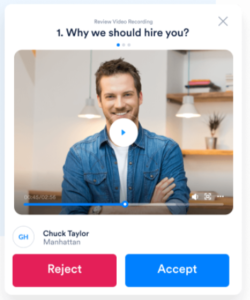Today on The Weekly Dose I take a look at the hourly recruiting technology, Fountain. Fountain is a technology designed to make high volume hourly hiring more efficient, easier, with higher quality.
The reality is most HCM-based Applicant Tracking Systems are not designed for high volume hourly. They are designed mostly to process requisitions for a salaried workforce. Candidates who will sit at a desktop and be willing to jump through hoops and take a bunch of time following each step.
Hourly workers, the vast majority who will only access the internet via their mobile device, will not jump through a bunch of hoops and have the patients to follow a long process. Thus, most organizations that have a high volume hourly hiring component tend to find a workaround to their ATS or go out and find technology, like Fountain, that can fix their hourly hiring inefficiencies while still getting the data they need into their HCM for onboarding and payroll.
- A mobile-based hiring process that makes it super easy and quick for an hourly candidate to apply and show interest. We don’t want a system that eliminates or discourages candidates to apply, we want them all to apply, and then let the technology screen and sort the best ones for us, which is what Fountain does.
- Built-in programmatic like functionality that allows you the TA team to boost specific jobs that aren’t having the candidate flow they need to meet your recruiting plan goals.
- Candidate communication via email and SMS, ability to communicate with groups of candidates at once through the entire process right from the platform.
- Fountain can automatically begin video screening candidates as they match certain criteria you need for each position, reducing time to fill dramatically.
- Simple Collaboration between applicant and hiring managers as many organizations with multi-locations have on-the-ground managers who do their own hourly hiring. So, great for franchise-type environments as well.
- Fully integrates with your HRIS and Payroll for easy onboarding of hourly hires all within the same recruiting process flow.
Why do I need a system just for hiring hourly workers?
That’s the big question, right? Quite frankly, you wouldn’t if the ATS you had was designed to actually be a benefit to you for high volume hourly hiring, but most are not. While they will say they are mobile-optimized, they are not built mobile-first. They were not built to have someone apply in a minute or less, verse twenty to thirty minutes.
Hourly workers have shown they are unwilling to “register” with your ATS before applying, and then click from screen to screen in what seems to be an endless maze of a process. They want to pick up their phone, show you they are interested, and almost instantly see if you have an interest or not. If you don’t have that, they’ll go apply to someone else that will. Speed, in mass-volume hourly hiring, is critical!
I recently witnessed an hourly worker apply, get screened, and have an offer of employment in 18 minutes! This hourly candidate had a job in 18 minutes! Why do you need a stand-alone hourly hiring platform? Because your competition is getting the best talent before you even see them.
Fountain is definitely worth a demo. It’s amazing to see how fast a recruiting process can work when you have the right technology in place. It’s all about getting high quality, fast, and Fountain delivers.




